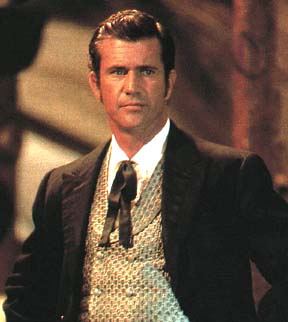Mel Gibson has gone a bit “Mad Max” over the “Da Vinci Code.” The director of “The Passion of the Christ” says that the latest hit movie based upon religion “weaves facts with maverick theories” reports a Web site citing Hollywood.com as its source.
 However, Gibson of all people should be the last person to criticize any film for taking dramatic license by positing specious theories and/or spinning some imagined history.
However, Gibson of all people should be the last person to criticize any film for taking dramatic license by positing specious theories and/or spinning some imagined history.
After all, the former Maverick had more than a few “maverick” moments in his own Jesus movie.
CultNews previous reported that Gibson portrayed Mary Magdalene pleading with the Romans to save Jesus after he is taken away to be tried by Jewish authorities.
Then he had Jesus tell Roman Governor Pontius Pilate that it’s the Jewish High Priest Caiaphas that will bear the “greater sin” for his execution.
And Mrs. Pilate even got into the act, tearfully bringing Mary the mother of Jesus, some towels and crying with her.
However, not one of these scripted moments is recorded specifically within the New Testament.
Mel Gibson made them up by weaving his “maverick theories” with Christian scriptures.
Gibson reportedly said that what “worries” him “is that people will take [‘The Davinci Code’] as fact.”
But that’s exactly what worried many critics about his Jesus movie even before it was released.
Specifically, critics said repeatedly before and after the film was released that Gibson’s audience would “take…as fact” his “theories,” which amounted to an implicit indictment of the Jews for deicide, which would contribute to anti-Semitism.
Unlike those associated with “The Da Vinci Code” such as Oscar-winning director Ron Howard, best-selling author Dan Brown, or two-time Oscar-winner Tom Hanks, Gibson, who received an Oscar for directing “Braveheart,” takes his Jesus movie very seriously rather than seeing it as simply entertainment.
“The Holy Ghost was working through me on this film,” Gibson once said.
But if that is true then why isn’t the questionable dialog within his movie somewhere in the bible?
One thing is without question and that is both “The Passion of the Christ” and “The Da Vinci Code” have the status of box office hits. And this was accomplished laregely through the controversy and “cult-following” each film developed, which fueled ticket sales.
Mel Gibson has no plans to spin “Passion” into a series, possibly offering a prequel regarding the ministry of Jesus or sequel, such as his version or vision of “The Resurrection.”
But it looks like Sony has decided that “The Da Vinci Code” will become a franchise and has already ordered up a movie script based upon another Dan Brown book.




You ask “why isn’t the questionable dialog within his movie somewhere in the bible?” First, Mel Gibson is a Catholic, and Catholics have Tradition in addition to Scripture.
Second, nothing in the film contradicted Scripture in any way.
And third, your statement that the depiction of Christ telling Pontius Pilate that the priest had the greater sin is erroneous:
John 19:6-11
When the chief priests, therefore, and the servants, had seen him, they cried out, saying: Crucify him, crucify him. Pilate saith to them: Take him you, and crucify him: for I find no cause in him. The Jews answered him: We have a law; and according to the law he ought to die, because he made himself the Son of God. When Pilate therefore had heard this saying, he feared the more. And he entered into the hall again, and he said to Jesus: Whence art thou? But Jesus gave him no answer. Pilate therefore saith to him: Speakest thou not to me? knowest thou not that I have power to crucify thee, and I have power to release thee?
Jesus answered: Thou shouldst not have any power against me, unless it were given thee from above. Therefore, he that hath delivered me to thee, hath the greater sin.